
Phobos is the innermost and larger of the two natural satellites of Mars, the other being Deimos. The two moons were discovered in 1877 by American astronomer Asaph Hall. It is named after Phobos, the Greek god of fear and panic, who is the son of Ares (Mars) and twin brother of Deimos.
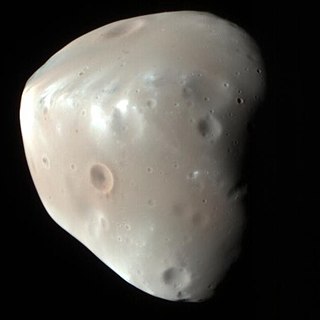
Deimos is the smaller and outer of the two natural satellites of Mars, the other being Phobos. Deimos has a mean radius of 6.2 km (3.9 mi) and takes 30.3 hours to orbit Mars. Deimos is 23,460 km (14,580 mi) from Mars, much farther than Mars's other moon, Phobos. It is named after Deimos, the Ancient Greek god and personification of dread and terror.

The Planetary Society is an American internationally-active non-governmental nonprofit organization. It is involved in research, public outreach, and political space advocacy for engineering projects related to astronomy, planetary science, and space exploration. It was founded in 1980 by Carl Sagan, Bruce Murray, and Louis Friedman, and has about 60,000 members from more than 100 countries around the world.

A lander is a spacecraft that descends towards, then comes to rest on the surface of an astronomical body other than Earth. In contrast to an impact probe, which makes a hard landing that damages or destroys the probe upon reaching the surface, a lander makes a soft landing after which the probe remains functional.

Law & Order: Special Victims Unit is an American police procedural crime drama television series created by Dick Wolf for NBC. The first spin-off of Law & Order, it stars Mariska Hargitay as Detective Olivia Benson, now the commanding officer of the Special Victims Unit after originally having been Stabler's partner in a fictionalized version of the New York City Police Department, and Christopher Meloni as Detective Elliot Stabler. Law & Order: Special Victims Unit follows the detectives of the Special Victims Unit as they investigate and prosecute sexually based crimes. Some of the episodes are loosely based on real crimes that have received media attention.
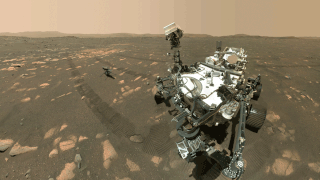
The planet Mars has been explored remotely by spacecraft. Probes sent from Earth, beginning in the late 20th century, have yielded a large increase in knowledge about the Martian system, focused primarily on understanding its geology and habitability potential. Engineering interplanetary journeys is complicated and the exploration of Mars has experienced a high failure rate, especially the early attempts. Roughly sixty percent of all spacecraft destined for Mars failed before completing their missions, with some failing before their observations could even begin. Some missions have been met with unexpected success, such as the twin Mars Exploration Rovers, Spirit and Opportunity, which operated for years beyond their specification.

Fobos-Grunt or Phobos-Grunt was an attempted Russian sample return mission to Phobos, one of the moons of Mars. Fobos-Grunt also carried the Chinese Mars orbiter Yinghuo-1 and the tiny Living Interplanetary Flight Experiment funded by the Planetary Society.
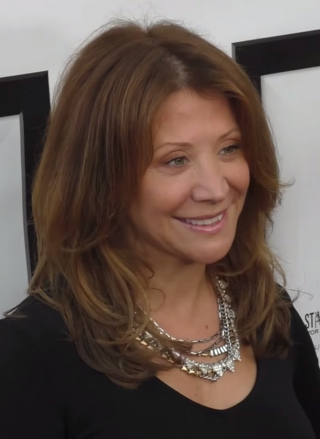
Cheryl Ann Oteri is an American actress and comedian. A Primetime Emmy Award nominee, she is best known for her tenure as a cast member on the NBC sketch comedy series Saturday Night Live from 1995 to 2000.

The two moons of Mars are Phobos and Deimos. They are irregular in shape. Both were discovered by American astronomer Asaph Hall in August 1877 and are named after the Greek mythological twin characters Phobos and Deimos who accompanied their father Ares into battle. Ares, the god of war, was known to the Romans as Mars.

A Mars sample-return (MSR) mission is a proposed mission to collect rock and dust samples on Mars and return them to Earth. Such a mission would allow more extensive analysis than that allowed by onboard sensors.
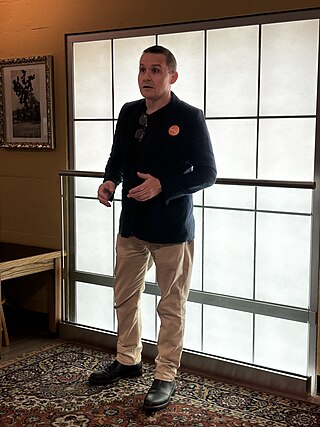
Francis French is a book and magazine author from Manchester, England, specialising in space flight history. He is a former director of events for Sally Ride Science, and a director at the San Diego Air & Space Museum.

The Living Interplanetary Flight Experiment was an interplanetary mission developed by the Planetary Society. It consisted of sending selected microorganisms on a three-year interplanetary round-trip in a small capsule aboard the Russian Fobos-Grunt spacecraft in 2011, which was a failed sample-return mission to the Martian moon Phobos. The Fobos-Grunt mission failed to leave Earth orbit and was destroyed.

The year 2011 saw a number of significant events in spaceflight, including the retirement of NASA's Space Shuttle after its final flight in July 2011, and the launch of China's first space station module, Tiangong-1, in September. A total of 84 orbital launches were conducted over the course of the year, of which 78 were successful. Russia, China and the United States conducted the majority of the year's orbital launches, with 35, 19 and 18 launches respectively; 2011 marked the first year that China conducted more successful launches than the United States. Seven crewed missions were launched into orbit during 2011, carrying a total of 28 astronauts to the International Space Station. Additionally, the Zenit-3F and Long March 2F/G carrier rockets made their maiden flights in 2011, while the Delta II Heavy made its last.
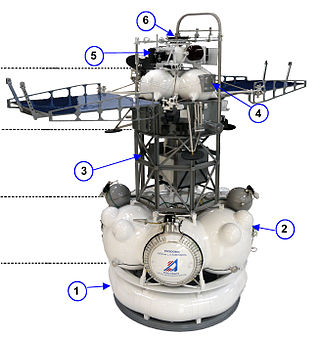
Yinghuo-1 was a Chinese Mars-exploration space probe, intended to be the first Chinese planetary space probe and the first Chinese spacecraft to orbit Mars. It was launched from Baikonur Cosmodrome, Kazakhstan, on 8 November 2011, along with the Russian Fobos-Grunt sample return spacecraft, which was intended to visit Mars' moon Phobos. The 115-kg (250-lb) Yinghuo-1 probe was intended by the CNSA to orbit Mars for about two years, studying the planet's surface, atmosphere, ionosphere and magnetic field. Shortly after launch, Fobos-Grunt was expected to perform two burns to depart Earth orbit bound for Mars. However, these burns did not take place, leaving both probes stranded in orbit. On 17 November 2011, CNSA reported that Yinghuo-1 had been declared lost. After a period of orbital decay, Yinghuo-1 and Fobos-Grunt underwent destructive re-entry on 15 January 2012, finally disintegrating over the Pacific Ocean.
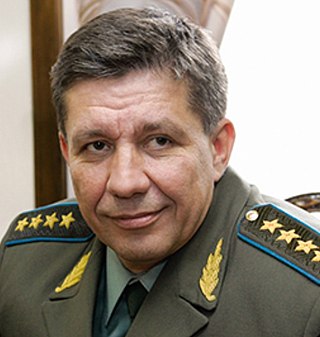
Vladimir Aleksandrovich Popovkin was a Russian statesman and military figure. He was a commander of the Russian Space Forces, then First Deputy Defense Minister of Russia, then Director of the Russian Federal Space Agency. He had the military rank of General of the Army and the federal state civilian service rank of 1st class Active State Councillor of the Russian Federation.
Events from the year 2012 in the Russia
Alexander Valentinovich Zakharov is a Soviet and Russian chief scientist and astronomer serving at the Russian Space Research Institute (IKI).
Mars-Grunt, also known as Expedition-M, is a robotic Mars sample return mission proposed to be sent to Mars in mid-2020s. It was proposed to the Russian Federal Space Agency (Roscosmos) by the Russian Space Research Institute.

The Asteroid Redirect Mission (ARM), also known as the Asteroid Retrieval and Utilization (ARU) mission and the Asteroid Initiative, was a space mission proposed by NASA in 2013; the mission was later cancelled. The Asteroid Retrieval Robotic Mission (ARRM) spacecraft would rendezvous with a large near-Earth asteroid and use robotic arms with anchoring grippers to retrieve a 4-meter boulder from the asteroid.














